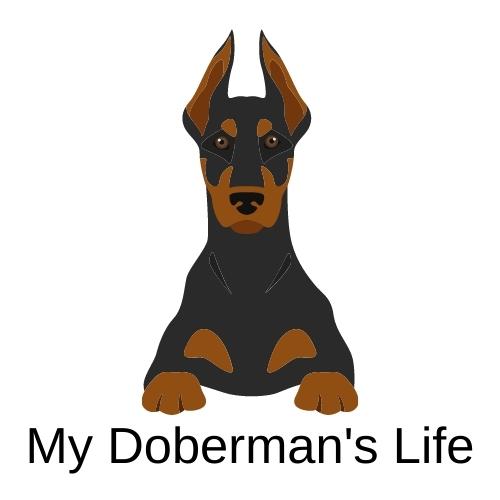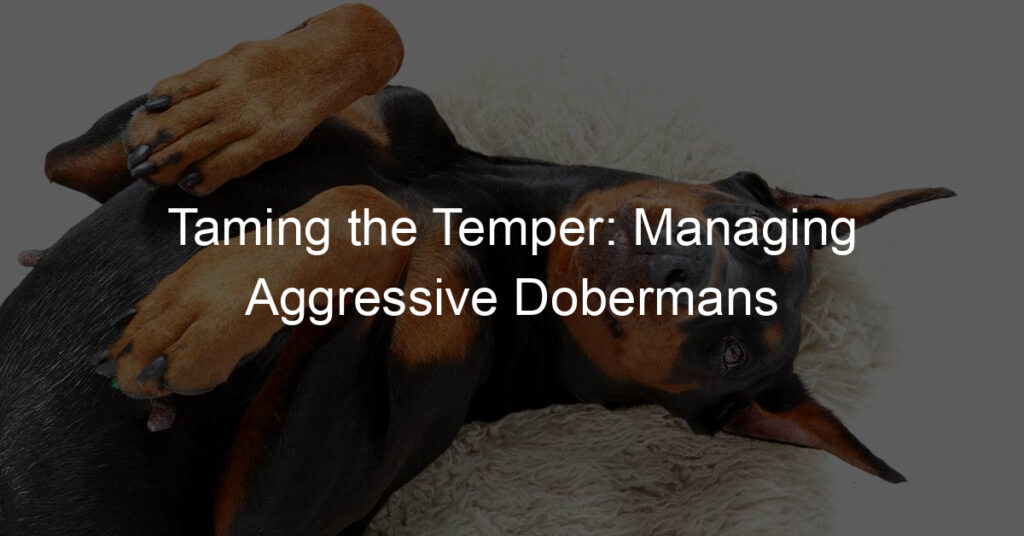
Introduction to Mini Doberman Training
Welcome to our comprehensive guide on Mini Doberman training. This guide is designed to help you understand the unique characteristics of the Mini Doberman breed and the importance of proper training. We’ll also introduce you to our Compact Canine Guide, a valuable resource for all small dog owners.
- Understanding the Mini Doberman breed
- Importance of training for your Mini Doberman
- Overview of the Compact Canine Guide
The Mini Doberman, also known as the Miniature Pinscher, is a small, energetic breed known for its intelligence and spirited personality. Despite their name, Mini Dobermans are not simply smaller versions of the Doberman Pinscher. They are a distinct breed with their own unique traits and characteristics.
Mini Dobermans are known for their agility and speed. They are also highly intelligent, making them quick learners. However, their energetic and independent nature can sometimes make them a challenge to train. That’s why it’s essential to understand their breed characteristics before starting your training journey.
Training is crucial for any dog breed, but it’s especially important for Mini Dobermans. Proper training can help channel their energy in a positive way and prevent behavioral issues. It can also strengthen the bond between you and your pet, making your Mini Doberman a more enjoyable companion.
Training your Mini Doberman can also ensure their safety. A well-trained dog is less likely to run away or get into dangerous situations. Moreover, training can help your Mini Doberman socialize with other dogs and people, enhancing their overall well-being.
The Compact Canine Guide is a comprehensive resource designed to help you navigate the challenges of training small dog breeds like the Mini Doberman. It covers everything from basic obedience training to more advanced techniques. The guide also includes tips on dealing with common behavioral issues, ensuring your Mini Doberman grows into a well-behaved and happy pet.
Understanding Mini Doberman Behavior
Mini Dobermans, also known as Miniature Pinschers, are known for their unique behaviors. Understanding these behaviors can help you build a stronger bond with your pet and provide them with the care they need. Let’s delve into some of the common behaviors exhibited by Mini Dobermans.
Common Mini Doberman Behaviors
Mini Dobermans are known for their distinctive traits. Here are some common behaviors you might notice in your Mini Doberman:
- Protective nature: Mini Dobermans are known for their protective instincts. They are loyal to their families and will not hesitate to protect their loved ones. This behavior is a part of their nature, making them excellent watchdogs. However, it’s essential to socialize them properly to prevent overprotectiveness.
- High energy levels: Mini Dobermans are energetic and active dogs. They require regular exercise to keep them healthy and happy. A lack of physical activity can lead to behavioral issues such as excessive barking or chewing. Ensure your Mini Doberman gets at least 30 minutes of exercise each day.
- Intelligence and trainability: Mini Dobermans are highly intelligent and trainable dogs. They are quick learners and can pick up new commands and tricks with ease. However, their intelligence also means they can get bored easily, so it’s important to keep their training sessions engaging and varied.
Understanding these behaviors can help you provide the right care and training for your Mini Doberman. Remember, every dog is unique, and your Mini Doberman may exhibit different behaviors. The key is to observe and understand their behavior to build a strong and loving bond.
Understanding Mini Doberman Communication
Communicating effectively with your Mini Doberman is crucial for establishing a strong bond and ensuring their well-being. This involves understanding their body language, vocalizations, and how to respond to their signals. Let’s delve into each of these aspects.
- Reading body language
- Understanding vocalizations
- Responding to your Mini Doberman’s signals
Mini Dobermans, like all dogs, use their bodies to express their feelings and intentions. For instance, a wagging tail often signifies happiness, while flattened ears can indicate fear or aggression. It’s important to pay attention to their body language to understand their mood and needs.
| Body Language | Meaning |
|---|---|
| Wagging tail | Happiness or excitement |
| Flattened ears | Fear or aggression |
Mini Dobermans use a variety of sounds to communicate. Barking, whining, growling, and howling are all forms of vocal communication. Each sound has a different meaning. For example, a high-pitched bark might mean they’re excited, while a low growl could be a warning.
| Vocalization | Meaning |
|---|---|
| High-pitched bark | Excitement |
| Low growl | Warning or discomfort |
Once you understand your Mini Doberman’s signals, it’s important to respond appropriately. If they’re showing signs of fear, for example, it’s best to give them space and comfort them when they’re ready. If they’re excited, engaging in play can be a great response.
In conclusion, understanding and responding to your Mini Doberman’s communication signals can significantly enhance your relationship with them. It allows you to meet their needs effectively and ensures a happy and healthy pet.
Mini Doberman Training Basics
Training your Mini Doberman can be a rewarding experience for both you and your pet. It’s important to start with the basics, as these will form the foundation for all future training. Let’s explore the first steps in training your compact canine.
Training Compact Canine: The First Steps
Training a Mini Doberman, like any other dog, requires patience, consistency, and understanding. Here are the first steps you should take:
- House training your Mini Doberman
- Leash training
- Socialization with other dogs and people
House training is the first step in any dog’s training journey. Start by establishing a routine for your Mini Doberman. This includes regular meal times and bathroom breaks. Remember, consistency is key. Praise your dog when they do the right thing to reinforce good behavior.
Leash training is essential for your Mini Doberman’s safety and your peace of mind. Start by introducing the leash in a calm environment. Gradually increase the time your dog spends on the leash, and always reward good behavior with treats or praise.
Socialization is crucial for your Mini Doberman’s development. It helps them become comfortable with different environments, people, and other animals. Start by introducing your dog to new people and pets in a controlled environment. Always monitor these interactions to ensure they remain positive.
Remember, every dog is unique, and what works for one might not work for another. Be patient, consistent, and positive, and your Mini Doberman will soon master these basic training steps.
Advanced Mini Doberman Training Tips
Once your Mini Doberman has mastered the basics, it’s time to move on to more advanced training. This will not only keep your dog mentally stimulated but also help to strengthen your bond. Here are some advanced training tips to consider:
- Teaching your Mini Doberman commands
- Agility training
- Addressing behavioral issues
Teaching your Mini Doberman advanced commands can be a fun and rewarding experience. Start with simple commands like ‘sit’, ‘stay’, and ‘come’. Once your dog has mastered these, you can move on to more complex commands like ‘heel’, ‘fetch’, and ‘leave it’. Remember, patience and consistency are key. It’s better to spend a few minutes each day training than to try and cram a week’s worth of training into one session.
Agility training is a great way to keep your Mini Doberman physically and mentally stimulated. It involves teaching your dog to navigate through a course of obstacles, such as jumps, tunnels, and weave poles. This type of training can help to improve your dog’s coordination, confidence, and focus. Plus, it’s a lot of fun!
Even the best-trained dogs can develop behavioral issues. If your Mini Doberman starts showing signs of aggression, fear, or anxiety, it’s important to address these issues as soon as possible. This might involve working with a professional dog trainer or behaviorist. Remember, it’s never too late to correct a behavioral issue. The key is to be patient, consistent, and understanding.
In conclusion, advanced training can greatly enhance your Mini Doberman’s quality of life. It can provide mental stimulation, improve behavior, and strengthen the bond between you and your dog. So why not give it a try?
Raising Mini Doberman: A Comprehensive Guide
When it comes to raising a Mini Doberman, understanding their unique needs is crucial. This guide will provide you with the necessary knowledge to ensure your Mini Doberman is healthy and happy.
Mini Doberman Care
Proper care for your Mini Doberman involves three key areas: nutrition, exercise, and regular health check-ups.
- Nutrition needs
- Exercise requirements
- Regular health check-ups
Mini Dobermans require a balanced diet to stay healthy. They need a mix of proteins, carbohydrates, fats, vitamins, and minerals. Proteins help build strong muscles, while carbohydrates provide energy. Fats are essential for skin and coat health, and vitamins and minerals support overall health. Always choose high-quality dog food that meets these nutritional needs.
Mini Dobermans are energetic and require regular exercise to stay fit and healthy. They enjoy activities like walking, running, and playing fetch. Aim for at least 30 minutes of exercise a day. Remember, a tired Mini Doberman is a happy Mini Doberman!
Regular health check-ups are vital to detect any potential health issues early. Your vet can provide vaccinations, perform routine tests, and give advice on diet and exercise. Aim for at least one check-up a year, or more if your Mini Doberman has health issues.
By understanding and meeting these care requirements, you can ensure your Mini Doberman lives a long, healthy, and happy life. Remember, every dog is unique, so it’s important to tailor your care to your Mini Doberman’s specific needs.
Caring for Mini Doberman: Special Considerations
When it comes to raising a Mini Doberman, there are some special considerations that you need to keep in mind. These include addressing common health issues, understanding breed-specific needs, and providing mental stimulation.
- Addressing Common Health Issues
- Understanding Breed-Specific Needs
- Providing Mental Stimulation
Mini Dobermans, like any breed, can be prone to certain health issues. Some of the most common include heart conditions, hip dysplasia, and skin allergies. Regular vet check-ups are crucial to catch any potential issues early. It’s also important to keep your Mini Doberman at a healthy weight, as obesity can exacerbate these health problems.
Mini Dobermans are known for their energy and intelligence. They require a diet rich in protein to fuel their active lifestyles. Additionally, they need plenty of exercise to keep them fit and prevent boredom. A bored Mini Doberman can become destructive, so it’s essential to provide them with plenty of toys and activities.
As mentioned, Mini Dobermans are highly intelligent dogs. This means they need more than just physical exercise – they also need mental stimulation. This can be provided through puzzle toys, obedience training, and even agility courses. Without adequate mental stimulation, Mini Dobermans can become anxious or depressed.
In conclusion, caring for a Mini Doberman involves more than just meeting their basic needs. By addressing their common health issues, understanding their breed-specific needs, and providing them with plenty of mental stimulation, you can ensure your Mini Doberman lives a happy, healthy life.
Conclusion: Your Mini Doberman Companion
As we conclude our comprehensive guide on raising a Mini Doberman, let’s take a moment to recap the key points and share some final tips to ensure your journey with your new companion is as joyful and rewarding as possible.
- Recap of Mini Doberman training and care: Training your Mini Doberman is a crucial aspect of their upbringing. Remember, consistency and patience are key. Use positive reinforcement techniques and keep training sessions short and engaging. When it comes to care, ensure your Mini Doberman gets plenty of exercise, a balanced diet, and regular vet check-ups.
- The joy of raising a Mini Doberman: Raising a Mini Doberman can be a truly rewarding experience. Their loyalty, intelligence, and playful nature make them wonderful companions. They are quick learners and with the right training and care, they can bring immense joy to your life.
- Final tips for your Mini Doberman Raising Guide: Always remember that every Mini Doberman is unique. Tailor your training and care to suit their individual needs. Keep the lines of communication open with your vet and don’t hesitate to seek professional help if you encounter any difficulties. Most importantly, enjoy the journey. The bond you’re building with your Mini Doberman is special and will only grow stronger with time.
As you embark on this journey with your Mini Doberman, remember that it’s not just about training and care. It’s about building a bond, creating memories, and enjoying the unconditional love and companionship that your Mini Doberman brings into your life. Happy raising!








